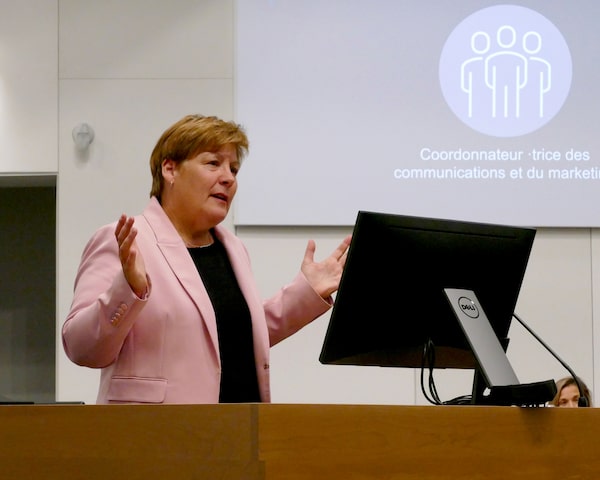
Quebec Court of Appeal Justice Marie-Josée Hogue speaks at the Université de Sherbrooke on Sept. 6, 2022. Ms. Hogue will lead an inquiry into foreign interference in Canada's democratic processes.Handout
Charles Burton is a senior fellow at the Macdonald-Laurier Institute, non-resident senior fellow of the European Values Center for Security Policy in Prague, and a former diplomat at Canada’s embassy in Beijing.
Some key questions were left begging for answers after the federal government finally announced that a public inquiry is being launched to investigate interference with Canada’s core democratic processes by China, Russia and other hostile entities – including any potential effects on the results of the 2019 and 2021 federal elections.
The long-awaited, much-demanded inquiry was confirmed Thursday when Public Safety Minister Dominic LeBlanc said it will be led by Quebec Court of Appeal Justice Marie-Josée Hogue, who will have less than six months to submit an initial report on her findings.
Justice Hogue appears to have little background in national security issues, with her own legal career having focused more on commercial and civil litigation, and professional liability. In light of this, will she be given the resources needed to complete a comprehensive study of this complex issue – within the tight deadline of February, 2024?
Under Canada’s Inquiries Act, last amended in 2005, she has the same power to compel witnesses to attend and give evidence under oath as is vested in any court of record in civil cases. But she also has the power to engage any “qualified persons” that “will have the same powers as the commissioners have to take evidence, issue subpoenas, enforce the attendance of witnesses, compel them to give evidence, and otherwise conduct the inquiry.”
Mr. LeBlanc said Justice Hogue will bring “fresh eyes” to topics that she otherwise has no demonstrated credentials to address. She is a respected and capable jurist, but will clearly need a lot of support, including leading experts with deep knowledge in the field, in order to fulfil this critical mission. If not, she could fall into the trap that evidently bedevilled her special-rapporteur predecessor David Johnston, who had to rely on “curated access” to top-secret documents and less-than-thorough debriefings from senior bureaucrats and politicians who might be worried that their denials of any evident ineffectiveness in countering Chinese interference in Canada’s democracy will not stand up to scrutiny.
Anyone who lacks the requisite expertise without adequate backup – no matter how intelligent – could be unfairly left vulnerable to deception and manipulation. To make this important inquiry work, Justice Hogue needs the support of well-prepared, tenacious interrogators – legal pitbulls – who can quickly spot and challenge any nonsense.
Then there is the elephant in the room of just how “public” this public inquiry will turn out to be. Mr. LeBlanc said Justice Hogue will have “full access” to all cabinet documents and other materials she deems to be relevant to her mandate. But she will still be subject to the restrictions of Canada’s Security of Information Act, meaning much of the investigation will be going on in-camera, visible only to people with high-level security clearances who will not be able to talk about it. What benefit all this will have for Canada really depends on how forthcoming and politically aggressive Justice Hogue is determined to be.
For Canadians, the crucial outcomes of this whole exercise could be captured in a few questions: Will any more Chinese diplomats involved in election interference be expelled from Canada? Will their proxies working here be held to account and see their day in court? Will we end up getting an effective foreign influence transparency registry to gain insight around any persons of influence in our Canadian democracy who have conflicts of interest by receiving benefits from a foreign state or its representatives (e.g. agents of the United Front Work Department of the Chinese Communist Party)? Will we get more clarity on why the government projected such an indifferent response to alarming reports of foreign malign, including activities detailed in a large number of federal government intelligence assessments?
The fact that Canada’s three main federal political parties endorsed Justice Hogue’s appointment should reassure Canadians that she is the best person available for the job. But did other distinguished figures, perhaps with more relevant experience, turn it down because they felt the restrictive terms and timeline on this inquiry will stop it from truly ferreting out the deep elite co-optation that China has so effectively cultivated within influential Canadian circles over many years?
Regardless, Justice Hogue has agreed to take on this extremely crucial task to reveal any rot within our democratic and governance processes. Canadians should anxiously wish her success, and demand she be given every tool needed to succeed.